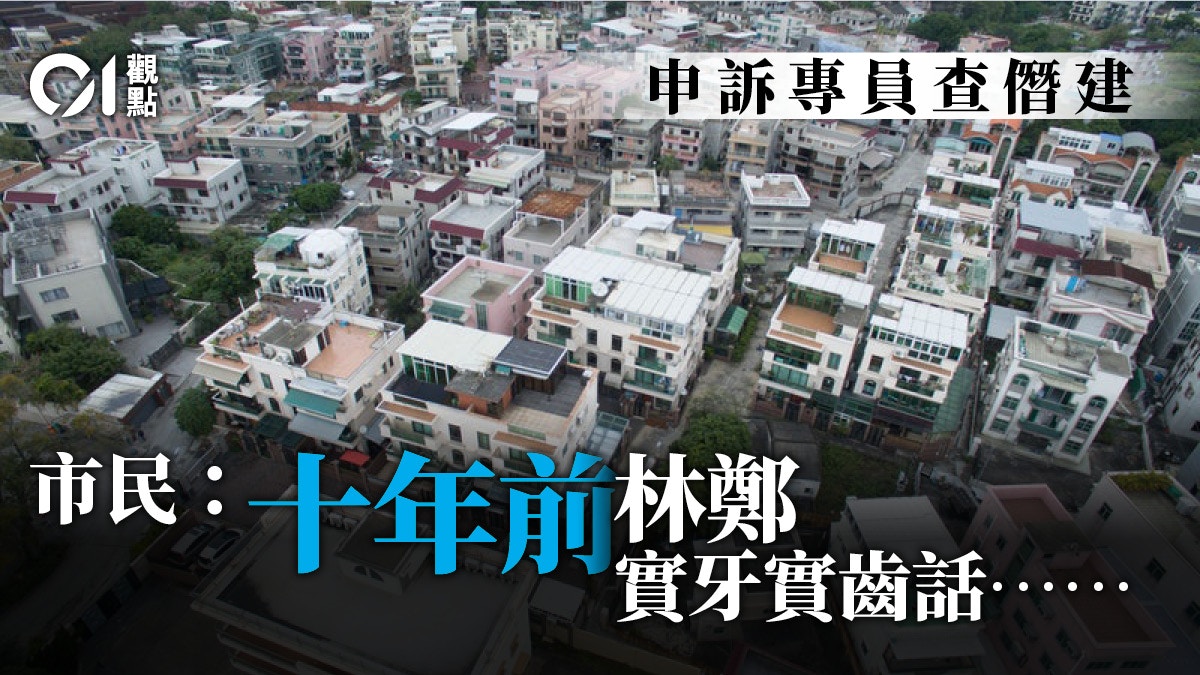01 view
Written by: Commentary Editing Room
2021-07-02 06:50
Last update date: 2021-07-02 06:50
The Ombudsman Zhao Huixian said on Tuesday (June 29) that he would actively investigate the illegal construction works of exempted buildings in the New Territories and examine the enforcement measures and effectiveness of the Lands Department and the Buildings Department.
However, the Office of The Ombudsman has actually studied similar issues in the past and put forward suggestions for improvement, reflecting that the Government has never squarely addressed the opinions of the Office in the past.
What impressed the public in particular was the fact that when the current Chief Executive Carrie Lam Cheng Yuet-ngor was serving as Director of the Development Bureau, he made a high-profile statement that the government would ban it severely, and in the end he was just posing.
The Buildings Department has implemented a new enforcement policy on illegal structures in New Territories village houses since 2012. The enforcement priority is determined by the method of "classified regulation and sequential processing" according to their severity and risk.
According to Zhao Huixian, even though the new law has been implemented for more than nine years, illegal construction of village houses in the New Territories is "still quite common." Therefore, the department decided to initiate an investigation to review the enforcement measures of the Buildings Department and the Lands Department in dealing with illegal construction. And efficiency, and make suggestions for improvement.
Lam Cheng: Don't cringe because of language and video violence
There are no statistics that can reflect the overall situation of illegal construction of village houses, but from other figures, we can see a little bit.
According to media enquiries from the Buildings Department, as of the end of last year, the authorities inspected 22,700 village houses, handled more than 42,000 illegal structures, issued more than 45,000 removal orders, and instituted more than 12,000 prosecutions.
Although this number seems to be a lot, if some Members said in 2018 that the authorities had accumulated more than 800,000 illegal construction cases, and it took 100 years to complete the processing, this would be a bottomless pond.
Another set of figures also reflects the lack of strength of the authorities' enforcement actions.
According to the figures of the Legislative Council, the Buildings Department issued an average of no less than 11,000 removal orders per year from 2015 to 2019, but the number of prosecutions prosecuted was no more than 3.5 thousand per year, and the number of closure orders issued was even more per year. No more than 12 times.
Although Carrie Lam said firmly when she was the Secretary for Development, "The determination of the authorities to enforce the law will not be shrunk by verbal violence and visual violence. It will only serve as motivation and gain widespread support from the community." However, she has completed the bureau and government affairs. The tenure of the director-general of the department has passed the five-year term of chief executive, and the above-mentioned figures have clearly reflected the effectiveness.
The Ombudsman Zhao Huixian invited the public to provide information or opinions on the enforcement actions taken by the government against illegal construction projects in the New Territories exempted buildings.
(Photo of the Office of The Ombudsman)
The cycle of complaints, investigations, suggestions and reviews
It is true that the illegal construction of village houses in the New Territories is not a curse planted by the Lam Cheng government. Instead, it can be traced back to the British Hong Kong era. However, the previous governments were incapable of handling the problem in a zero-tolerant manner and would allow the problem to continue to worsen.
As early as 1994, the Ombudsman criticized the Lands Department by name and did not give priority to the implementation of the lease clauses. As a result, the illegal construction of village houses in the New Territories became more and more serious. In the perpetual cycle of complaints, investigations, suggestions and reviews.
After the reunification, most of the investigations conducted by the Commissioner’s Office on the issue of illegal construction were criticized in different words.
For example, when the second investigation was initiated in 2004, its report criticized the Lands Department for being affected by insufficient resources, so that it "didn't deal with the relevant issues seriously."
In 2011 and 2015, the PCPD also criticized the Buildings Department and the Lands Department for their "indecision" and lack of coordinated follow-up.
It can be seen that it is not only the owners involved in illegal construction that have not changed after repeated persuasion, but also two major government departments whose laissez-faire problems have worsened.
A future Ombudsman investigation report is unknown whether the old tune will be repeated, but the government can no longer acquiesce in the growing trend of illegal construction.
The original intention of the small house policy was to improve the living environment of the original inhabitants, but now many illegal structures are not just for storage purposes. Owners even use rents to make profits and become illegal means of making money. The government should not just ignore it. In the long run, it is also necessary to withdraw the rights of the indigenous inhabitants and abolish the privilege of building houses for the indigenous inhabitants, so that the economic distribution tends to be equal.
How can the government be willing to "basking in the sun" for applications for short-term leases of government land for five years
The crime of polluting the water area of the rainwater pipes in the sewage of private buildings is in the bureaucracy
It is urgent to ban "subdivided housing" in industrial buildings
Laziness in land administration is also a problem
Office of The Ombudsman Zhao Huixian (The Ombudsman) Lands Department Small House Department 01 Viewpoint

